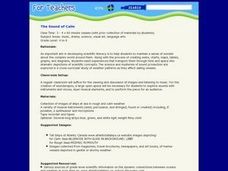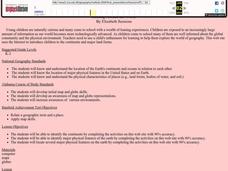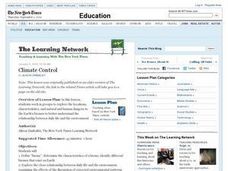Curated OER
The Sound of Calm
Students examine the relationships that exist between ocean currents, wind and climate. Using those relationships, they discuss how they affect the oceans. They create their own music to represent the sounds of the ocean and share them...
Curated OER
An Ancient Greek and Roman Festival
Third graders label a map of ancient Greek and Roman civilizations and do a written report on one element of these two cultures. They participate in discussions of food, farming, daily life and government (among others). Students use the...
Curated OER
Building an Empire Mapping China
Students create travel brochures of China's nine regions and make a bulletin board display with them.
Curated OER
Where In the World is the Dominican Republic?
Students begin the lesson by discussing how where they live affects how they live. As a class, they add examples to each category such as home types, clothing, jobs and food. Using those categories, they write about their life in the...
Curated OER
Mapping Dinosaurs in Place and Time
Third graders study the continents that specific dinosaurs lived on. They compare the continent's location and climate when dinosaurs live there with its current location.
Curated OER
Reading Around the World
Students use the internet to identify the seven continents. Using maps, they locate and identify major physical features of Earth. They are read different books by various authors on the Earth and answer questions related to it. They...
Curated OER
Camp Stark, New Hampshire, World War II Prisoner-of-War Camp
Students examine the political, personal, and geographical boundaries created by World War II to the citizens and prisoners of war at Camp Stark.
Curated OER
Climate Change Challenge: Earth Day
Students explore the concept of philanthropy. In this environmental stewardship lesson plan, students watch a video about state policies pertaining to greenhouse gas emissions. Students plan and carry out an Earth Day service project...
Curated OER
Some Like it Cold: Canada's Northern Communities
Fifth graders examine cultures close to the arctic circle. For this geography lesson, 5th graders consider the impact of climate on cultural development of arctic communities. Students research a given community and present their...
Curated OER
Climate Control
Students explore the locations, characteristics, and natural and human dangers to the Earth's biomes to better explain the relationship between daily life and the environment.
Curated OER
Some Like It Cold
Sixth graders study Canada's northern territories and four settlements above the Arctic Circle. In this northern Canada lesson, 6th graders maps and timelines to locate physical, political, and economic features of northern Canada....
Curated OER
The Growth of Islam
Seventh graders gain insight into the daily lives of Muslims and to develop empathy for them by studying the Islamic world and creating presentations.
Curated OER
Massive Migrations
Here is an exciting exploration of a fascinating topic for your emerging ecologists: bird migration! They begin by visiting the US Fish & Wildlife Service website to discover which Arctic birds come to their areas. They are assigned...
Curated OER
The Geography of China
Viewers will love this field trip to China, complete with information about China's economy, topography, geography, climate, and demographics. Maps and photos help to support the claims in the slides, especially in some interesting...
Curated OER
The Geography of Japan
A comprehensive look at Japan and its characteristics will engage and inform the viewer about one of the most prominent powers in the world today. The demographics, topography, and climate of Japan are covered in these slides with maps,...
Curated OER
Rain Forests: A Disappearing Act?
Students examine and locate rainforests on maps, and research the patterns of their destruction. They develop a bar graph of rainfall and temperature data, write a journal entry, and research the people, animals, and plants/products of...
Curated OER
The Influence of Physical Geography
Students explore the limits and demands of their physical world and how it relates to the survival and well-being of people.
Curated OER
What's Russia To Do?
Students watch a PowerPoint presentation on the Gulag system in Russia. In groups, they use the internet to create maps on climate and population pyramids for the country of Russia. They must use this information and develop a plan to...
Curated OER
Spice Up Your Life
Second graders identify major spices found in the world. They link spices with countries they are grown in and the uses for these valuable items.
Curated OER
Northwest Hawaiian Islands
Students compare and contrast places around the world. Students analyze the effects of human activity on the physical environment and devise plans to address the consequences. Students also focus on geographical topics such as formation...
Curated OER
Location, Location, Location: Civilization's Ultimate Advantage
Students discover how geographical advantages, locational and regional, ultimately led to western Eurasian societies' disproportionate accounting of world power and innovation. They utilize a workbook which can be downloaded within this...
Curated OER
Newport Weather Project
Learners study weather and climate patterns using computer and Internet resources. They collect temperature information and share it with other classes via e-mail using graphs
Curated OER
A Tale of Two Frogs
Second graders locate Russia on a map or globe and work in pairs to complete the Map worksheet. They read the book, A Tale of Two Frogs stopping after page 15. They write an ending to the story and then read more of the book stopping...
Curated OER
Iraq, Where's That?
Students identify the Middle Eastern countries on the map and the oil-producing countries of OPEC in the region. They examine whether the presence of important producing oil fields qualifies as a characteristic of this region.

























